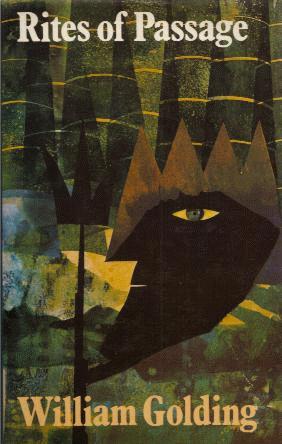
William Golding
The following novels constitute the shortlist for the 1980 Booker Prize:
Notable Omissions from the 1980 Shortlist

|
Rites of Passage William Golding |
Dustjacket synopsis:
"An ancient ship of the line converted to general purposes is making her way from the South of England to Australia. She
carries a few guns, some cargo, some animals, some seamen, some soldiers, some emigrants and a few ladies and gentlemen.
There is a clergyman of the Church of England. There is Wilmot Brocklebank, lithographer, marine artist and portrait
painter. There is a young army officer.
"Representing the higher echelons of administration is young Mr Talbot, setting out with the utmost confidence towards a distinguished career. But the voyage teaches him some unexpected things. It affords him more opportunities for observing the ceremonies that mark a progres through life - more chances for a mixture of acute observation and sheer misjudgement - than he could possibly record in his journal; though, for his godfather's entertainment, he tries his best. Though Talbot is mistaken in Deverel, instructed by Mr Summers, seduced by Miss Brocklebank, and shocked by Miss Granham, he finds it unnecessary in the event to keep an eye on Mr Prettiman. But it is a sadder and more responsible man who learns from the Reverend Robert James Colley what a bitter taste there is to remorse when it is unavailing.
"The publication last year of Darkness Visible, William Golding's first novel for many years, restored, as Frank Tuohy wrote in The Times Literary Supplement, 'a living force among us'. 'The writing displays,' Mr Tuohy continued, 'in episode after episode, an intensity of vision without parallel in contemporary writing.' Rites of Passage provides further evidence of the diversity, range and power of his sympathies and his imagination."
First Paragraph:
Honoured godfather,
With those words I begin the journal I engaged myself to keep for you - no words could be more suitable!
Very well then. The place: on board the ship at last. The year: you know it. The date? Surely what matters is that it is the first day of my passage to the offier side of the world; in token whereof I have this moment inscribed the number "one" at the top of this page. For what I am about to write must be a record of our first day. The month or day of the week can signify little since in our long passage from the south of Old England to the Antipodes we shall pass through the geometry of all four seasons!
This very morning before I left the hall I paid a visit to my young brothers, and they were such a trial to old Dobbie! Young Lionel performed what he conceived to be an Aborigine's war dance. Young Percy lay on his back and rubbed his belly, meanwhile venting horrid groans to convey the awful results of eating me! I cuffed them both into attitudes of decent dejection, then descended again to where my mother and father were waiting. My mother - contrived a tear or two? Oh no, it was the genuine article, for there was at that point a warmth in my own bosom which might not have been thought manly. Why, even my father - We have, I believe, paid more attention to sentimental Goldsmith and Richardson than lively old Fielding and Smollett! Your lordship would indeed have been convinced of my worth had you heard the invocations over me, as if I were a convict in irons rather than a young gentleman going to assist the governor in the administration of one of His Majesty's colonies! I felt much the better for my parents' evident feelings - and I felt the better for my own feelings too! Your godson is a good enough fellow at bottom. Recovery took him all the way down the drive, past the lodge and as far as the first turning by the mill!
From the Faber & Faber hardback edition, 1981.
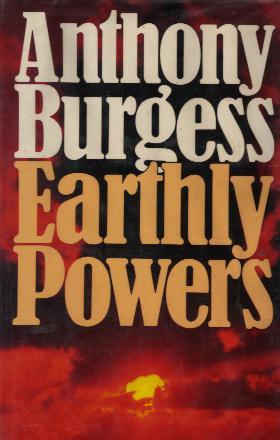
|
Earthly Powers Anthony Burgess |
Dustjacket synopsis:
"Earthly Powers is Anthony Burgess's supreme achievement as a novelist. An entralling, epic narrative that spans
six decades of history, that spotlights some of the most vivid events and characters of the twentieth century, it is a
novel about the nature and the origins of evil.
"As told by the central character himself, a distinguished British writer in his eighties, Earthly Powers is the life of Kenneth Marchal Toomey - from the First World War to the final years of sun-drenched idleness in Malta. A homosexual unable to reconcile his nature with the teachings of the Church, Toomey opted as a young man for a life of loneliness and exile - first in the Paris of James Joyce and Ezra Pound and later in Hollywood at the height of its glamour and corruption.
"His travels, his many assignments and, indeed, the affections of his heart, bring him face to face with the most savage manifestation of evil in the modern world; the murder by witchcraft of a beloved friend in Malaya; the brutalities of Mussolini's fascists; a Nazi death camp; mass suicide in the name of love in California. Breathing the stench of Buchenwald, Toomey sees finally that evil comes from man himself, it is inborn; for his brother-in-law Carlo, the saintly but sybaritic priest destined to be Pope, it is a force at large in the world that must be challenged constantly in all its guises.
"Despite the darkness of its theme, Earthly Powers is a rewarding entertainment - full of invention, of dazzling word-play, of humour and compassion, of brilliantly sustained portraits of the famous, the infamous and the unforgettable. It is a magnificent accomplishment by one of the most prodigiously gifted of contemporary writers."
First Paragraph:
It was the afternoon of my eighty-first birthday, and 1 was in bed with my catamite when Ali announced that the archbishop had come to see me.
'Very good, Ali,' I quavered in Spanish through the closed door of the master bedroom. 'Take him into the bar. Give him a drink.'
'Hay dos. Su capellán también.'
'Very good, Ali. Give, his chaplain a drink also.' I retired twelve years ago from the profession of novelist. Nevertheless you will be constrained to consider, if you know my work at all and take the trouble now to reread that first sentence, that I have lost none of my old cunning in the contrivance of what is known as an arresting opening. But there is really nothing of contrivance about it. Actuality sometimes plays into the hands of art. That I was eighty-one I could hardly doubt: congratulatory cables had been rubbing it in all through the forenoon. Geoffrey, who was already pulling on his over-tight summer slacks, was, I supposed, my ganymede or male lover as well as my secretary. The Spanish word arzobispo certainly means archbishop. The time was something after four o'clock on a Maltese June day - the twenty-third, to be exact and to spare the truly interested the trouble of consulting Who's Who.
From the Hutchinson hardback edition, 1980.
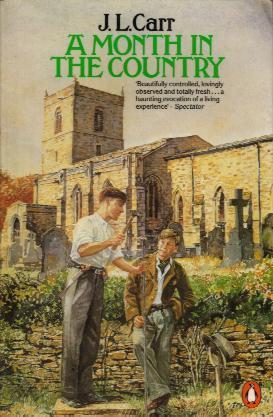
|
A Month in the Country J.L. Carr |
Dustjacket synopsis:
"In the summer of 1920 two men meet in the quiet English countryside.
"One is war survivor, living in a church, intent upon uncovering and restoring a historical wall-painting. The other, too, is a war survivor, camping in the next field in search of a lost grave.
"And out of their physical meeting comes a deeper communion, with the landscape, with history; and a catching up of the old primeval rhythms of life - past and present - so cruelly disorientated by the Great War."
Quotes:
"Beautifully controlled, lovingly observed and totally fresh...a haunting evocation of a living experience" - Spectator
"J.L. Carr's novel is something which nobody should miss...a beautiful tale and a profoundly affecting one" - Standard
First Paragraph:
When the train stopped I stumbled out, nudging and kicking the kitbag before me. Back down the platform someone was calling despairingly, 'Oxgoldby ... Oxgoldby.' No-one offered a hand, so I climbed back into the compartment, stumbling over ankles and feet to get at the fish-bass (on the rack) and my folding camp-bed (under the seat). If this was a fair sample of northerners, then this was enemy country so I wasn't too careful where I put my boots. I heard one chap draw in his breath and another grunt: neither spoke.
Then the guard whistled, the train jerked forward a couple of paces - and stopped. This was enough to goad the old man in the nearside corner to half-lower his window. "Thoo's ga-ing ti git rare an' soaaked reet doon ti thi skin, maister," he said and shut the window in my face. Then the engine blew up a splendid plume of steam and shuffled off, a row of faces staring woodenly at me. And I was alone on the platform, arranging my pack, taking a last look at a map, pushing it into my topcoat pocket, levering it out again to spill my ticket on the stationmaster's boots, wishing I'd sewn on two missing buttons, hoping it would stop raining until I had a roof over my head.
From the Penguin paperback edition, 1985.
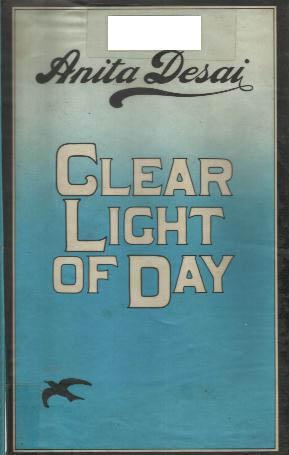
|
Clear Light of Day Anita Desai |
Dustjacket synopsis:
"To Tara, revisitng her childhood home in old delhi, the dusty, shabby house and neglected garden seem only too familiar,
her sister and brother quite unchanged. Yet the impression is superficial, for here is no dead end, no cul-de-sac, and within
the old and the known there are new discoveries to be made. Tara's visit stirs many memories of a shared past. The old
episodes and dramas of childhood, never entirely explored, can reveal new worlds - if only the courage can be found to face
them.
"Anita Desai creates a picture of a family, of a society, which brings both people and placesluminously alive. Using the shifting persepctive of past and present, she spins a complex web of recurrent episodes and images into a dazzling whole."
First Paragraph:
The koels began to call before daylight. Their voices rang out from the dark trees like an arrangement of bells, calling and echoing each others' calls, mocking and enticing each other into ever higher and shriller calls. More and more joined in as the sun rose and when Tara could no longer bear the querulous demand in their voices, she got up and went out onto the veranda to find the blank white glare of the summer sun thrusting in between the round pillars and the purple bougainvillea. Wincing, she shielded her eyes as she searched for the birds that had clamoured for her appearance, but saw nothing. The cane chairs on the veranda stood empty. A silent line of ants filed past her feet and down the steps into the garden. Then she saw her sister's figure in white, slowly meandering along what as children they had called 'the rose walk'.
Dropping her hands to pick up the hem of her long nightdress, Tara ran down the steps, bowing her head to the morning sun that came slicing down like a blade of steel onto the back of her neck, and crossed the dry crackling grass of the lawn to join her sister who stood watchin smiling.
From the William Heinemann hardback edition, 1980.
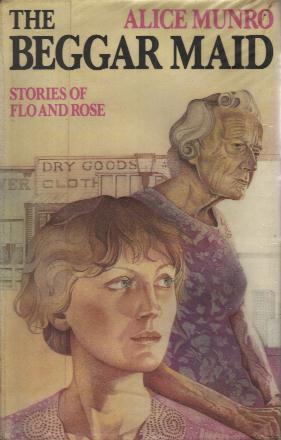
|
The Beggar Maid Alice Munro |
Dustjacket synopsis:
"As a child Rose had a hard life. Born into the hard back-street life of a small Canadian town, her mother dead, she
battled constantly with her stepmother Flo, a practical and shrewd woman, who cowed her with tales from her own past
and warned her of the dangerous world outside. Flo was both soft and hard, full of outrages and sorrows jumbled
together. Rose was ambitious, determined and clever. She won a scholarship and left for Toronto, where she married
Patrick, heir to a department store chain. For Patrick, Rose was his Beggar Maid, 'meek and voluptuous, with her sly
white feet', and he, her knight, content to sit and adore her.
"In The Beggar Maid, winner of the 1979 Governor General's Award, Canada's highest literary prize, Alice Munro takes us into Rose's life through ten interlocking stories - from her earliest childhood, to her separation and life after marriage - tales of extraordinary depth and power. A brilliant writer with a growing reputation this is Alice Munro's fourth book."
First Paragraph:
Royal Beating. That was Flo's promise. You are going to get one Royal Beating.
The word Royal lolled on Flo's tongue, took on trappings. Rose had a need to picture things, to pursue absurdities, that was stronger than the need to stay out of trouble, and instead of taking this threat to heart she pondered: how is a beating royal? She came up with a tree-lined avenue, a crowd of formal spectators, some white horses and black slaves. Someone knelt, and the blood came leaping out like banners. An occasion both savage and splendid. In real life they didn't approach such dignity, and it was only Flo who tried to supply the event with some high air of necessity and regret. Rose and her father soon got beyond anything presentable.
Her father was king of the royal beatings. Those Flo gave never amounted to much; they were quick cuffs and slaps dashed off while her attention remained elsewhere. You get out of my road, she would say. You mind your own business. You take that look off your face.
From the Allen Lane hardback edition, 1979.
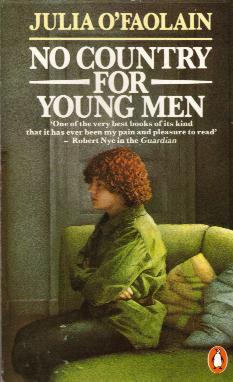
|
No Country for Young Men Julia O'Faolain |
Dustjacket synopsis:
"Julia O'Faolain unleashes a brilliant and devastating story of human and political relations in contemporary
Ireland. Past and present: memory, madness and buried trauma shift in a disturbing kaleidoscope a four generations
of the O'Malleys and Clancys attempt to come to terms with the after-affects of the Irish Civil War - the 'troubles'
of the 1920s."
Quotes:
"One of the very best books of its kind that it has ever been my pain and pleasure to read" - Robert Nye, Guardian
"Entertaining and rich in comedy...gripping and moving and very apt as Ireland's troubles continue into
the 80s" - William Trevor
"A book to be bought and read and thought about" - Irish Times
"A marvellous novel" - John Braine
First Paragraph:
In late March 1922, the following item appeared in the columns of the Gaelic American, a journal published in New York City, price 5 cents:
AMERICAN CITIZEN
LATEST MARTYR TO IRISH CAUSE
Word has been received by relatives in New York and by The Friends of Irish Freedom of the death of one of their delegates to the Old Land. John Chrysostom Spartacus (Sparky) Driscoll was killed while performing his mission which was to observe the fighting being fomented in Ulster by agents of the crown. Thetime-honoured tactic, 'divide and rule', has set Irishman against Irishman in a last-ditch try by the old usurper to strangle the new Free State at birth. This act of perfidy strikes at John Bull's oft-aired claim to 'justice and fair play'.
From the Penguin paperback edition, 1987.
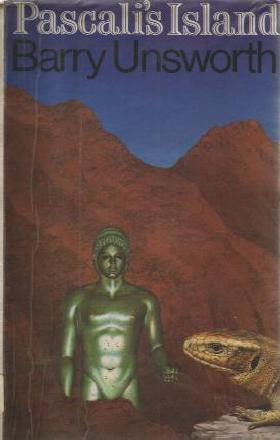
|
Pascali's Island Barry Unsworth |
Dustjacket synopsis:
"It is the summer of 1908, on a Greek island off the coast of Asia Minor, a small particle of the vast decaying Ottoman
Empire. On the island, a Levantine informer, Pascali, in the pay of the Ottoman authorities, has for twenty years
been sending in his reports to Constantinople - reports never acknowledged, never acted upon. Now the Greeks on the
island have discovered what he is; his days are numbered.
"An Englishman arrives on the island: archeologist, confidence man, agent provocateur, which is he? In an attempt to find a meaning for himself, for the long silence of the authorities, for the presence of the Englishman, Pascali begins his last report, which is also his testament. Obsessively he watches, follows, writes about, the activities of the Englishman, who has the fatal gift of enmeshing others in his projects.
"Barry Unsworth's superlatively absorbing novel brilliantly captures the atmosphere of menace, treachery and death, prefiguring the larger disaster looming over Europe."
First Paragraph:
July 1908
Lord of the world. Shadow of God on earth. God bring you increase.
You do not know me, Excellency. I am your paid informer on this island. One of them at least, for there may be others. Forgive this temerity of your creature in addressing you. I am driven to it. I can no longer endure the neglect of your officials. In spite of repeated humble requests no word has come to me from the Ministry, no single word of acknowledgement. Never. Not from the beginning. Twenty years, Excellency. I sit here at my table, in the one room of my house above the shore, on this island, far from Constantinople and the centres of power. I have calculated that this is my two hundred and sixteenth report.
It promises to be my last. The Greeks know. I have suspected it for some time, there have been indications, but it was only this morning, not three hours ago, that I became convinced of it, at the quayside, just after the Englishman had disembarked.
They know. I saw it on the face of old Dranas this morning.
Everything the same: pain of neglect; sea and shore outside my window; benign sea light on the few words already written and the blank pages waiting, on my plump, short-fingered, inoffensive hands. Yet everything changed. It may take days or weeks but I am as good as dead. Undeservedly. No one has ever suffered as a result of my reports. Now I am in the open, soft-skinned, like the crucified man. (I saw a man who had been crucified, when I was a child, in Scutari.)
From the Michael Joseph back edition, 1980.
Notable Omissions from the Shortlist:
"Old Soldiers", Paul Bailey
"The Transit of Venus", Shirley Hazzard
"Riddley Walker", Russell Hoban
"Lamb", Bernard MacLaverty
"A Few Green Leaves", Barbara Pym
"Puffball", Fay Weldon
"The Healing Art", A.N. Wilson
This page and its contents are copyright © 2002 by Perry Middlemiss, Melbourne, Victoria, Australia.
Last modified: April 16, 2002.